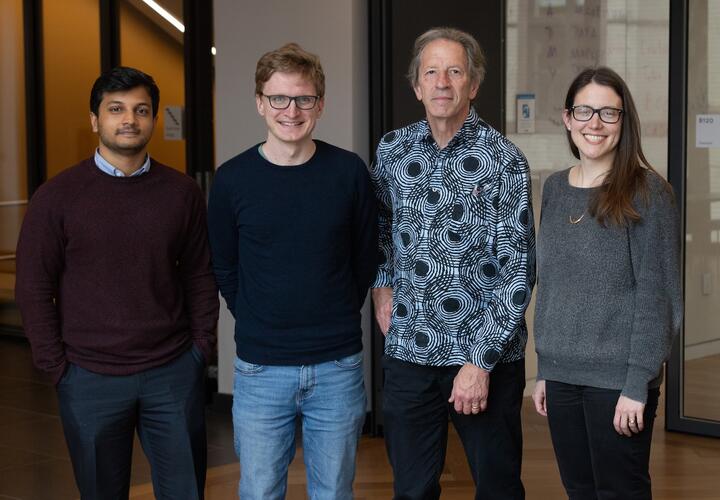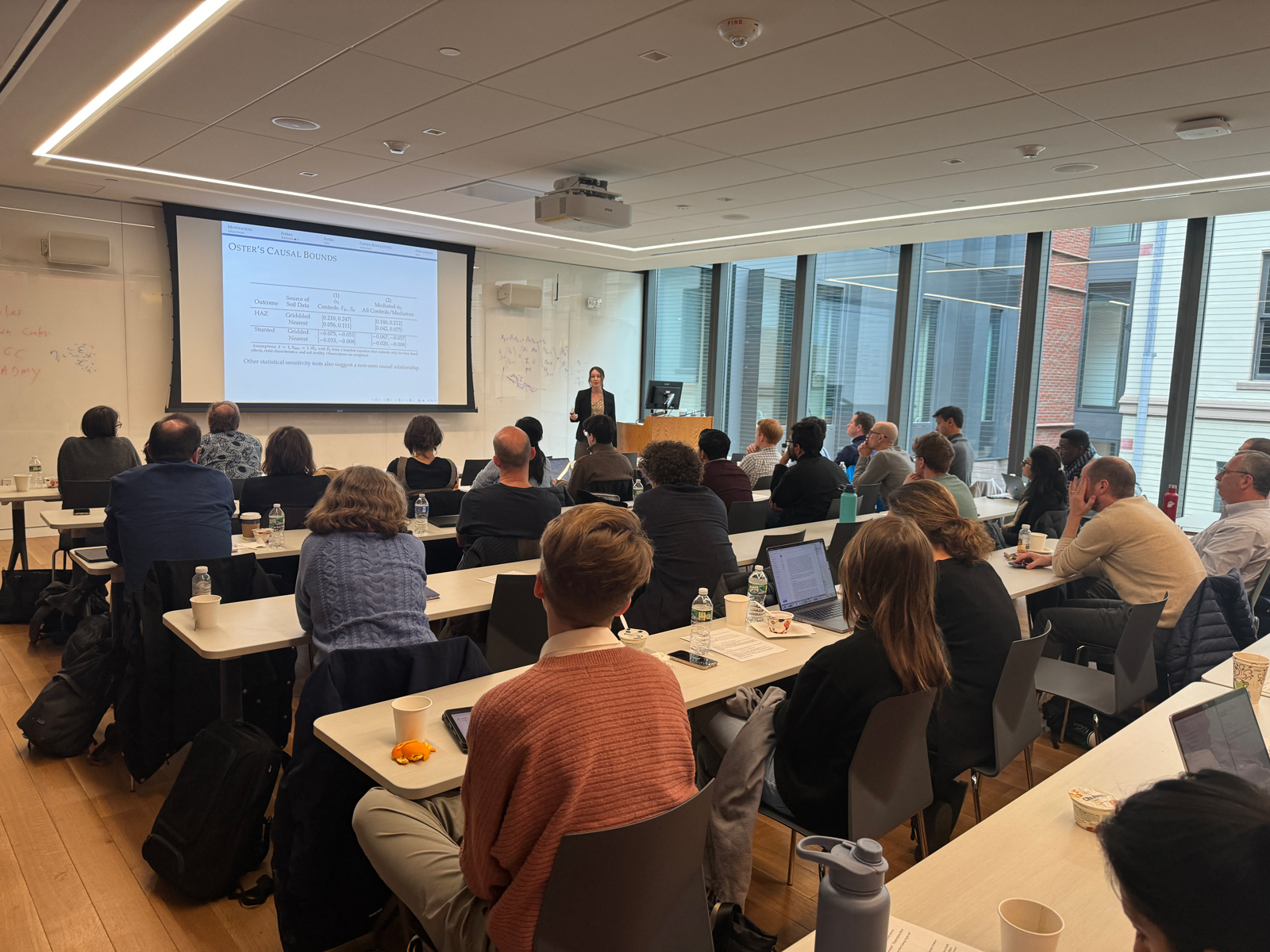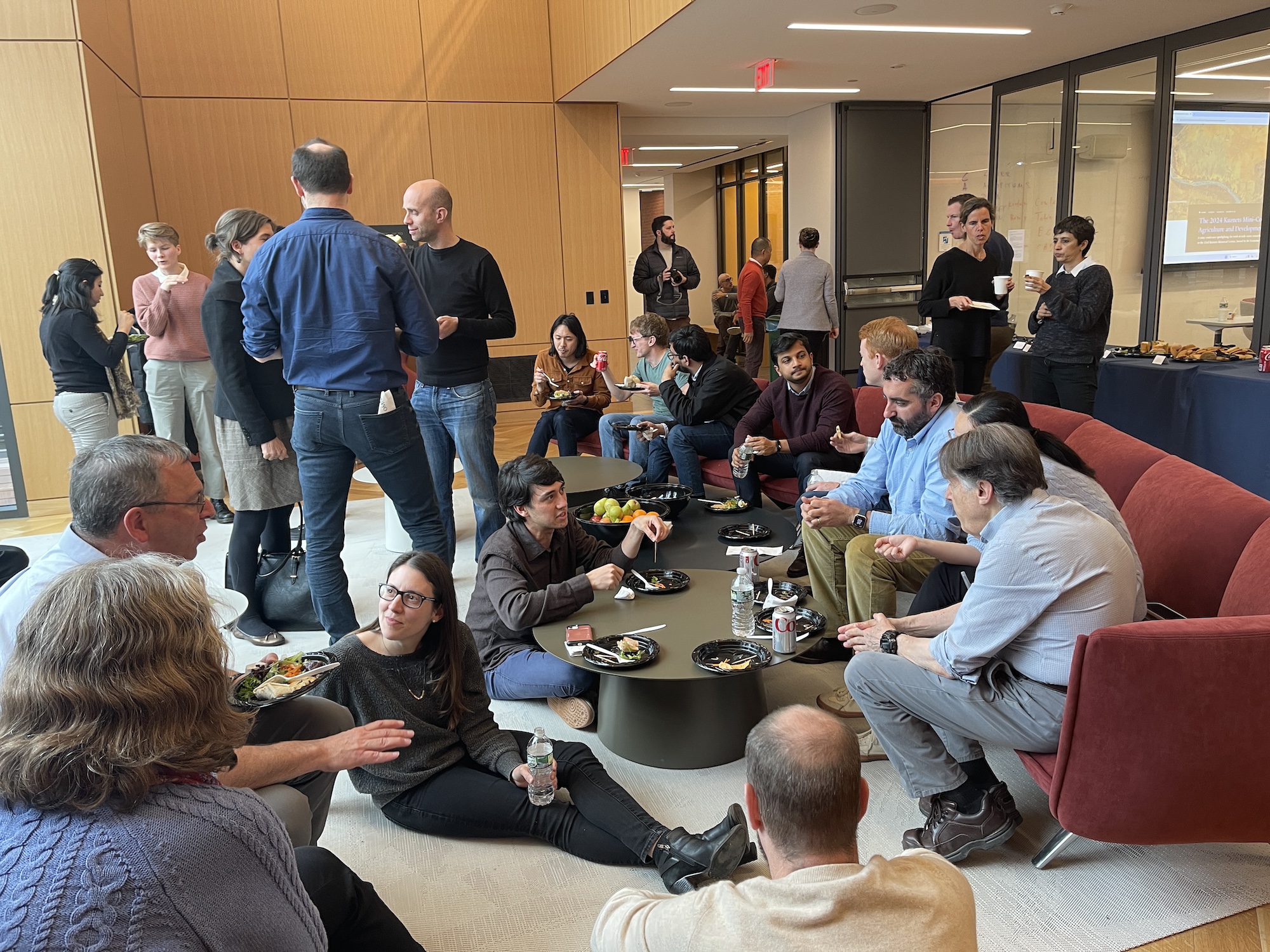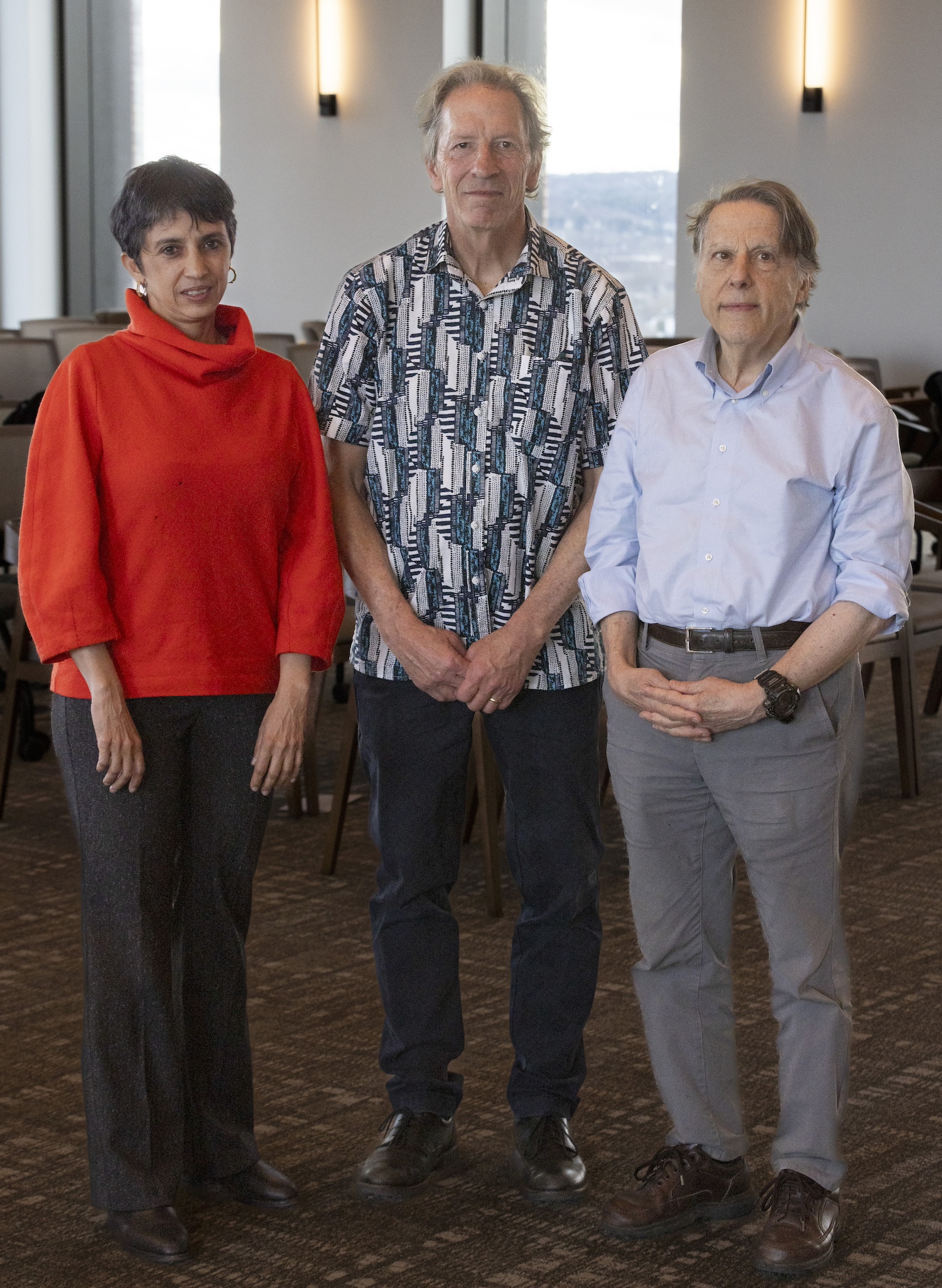Agriculture and Development: Highlights from the 2024 Kuznets Mini-Conference
The Economic Growth Center hosted the Kuznets Mini-Conference on Agriculture and Development on April 5, 2024, bringing together early-career researchers studying agricultural markets in low- and middle-income countries. Sagar Saxena, a postdoctoral associate at the Economic Growth Center, describes the event and highlights the key takeaways from the conference.

Conference organizers (L-R) Sagar Saxena and Patrick Agte, both EGC Postdoctoral Associates at EGC; Christopher Udry, the Robert E. and Emily King Professor of Economics at Northwestern University; and Lauren Falcao Bergquist, Assistant Professor of Economics and Global Affairs and EGC affiliate.
EGC hosts the 2024 Kuznets Conference on Agriculture and Development
Agriculture continues to be an important sector for low- and middle-income countries (LMIC), serving not only as a source of food but also a major employer and income-generator for a majority of households. Economists interested in development have long studied various aspects of agriculture to address issues such as low yields, limited adoption of mechanization and other productive inputs, rigid land tenure systems, and the impact of these factors on farmer incomes, nutrition, and rural poverty.
As we head deeper into the 21st century, not only do these issues remain, new challenges have emerged. Climate change has become a major concern, with erratic weather patterns, droughts, floods, and other extreme weather events threatening agricultural productivity and food security. At the same time, new opportunities are arising with the advent of digital technologies, mobile phones, and e-commerce platforms that could potentially revolutionize agricultural markets and supply chains in developing countries.
Against this backdrop, the Economic Growth Center (EGC) at Yale University hosted a mini-conference to showcase the latest research in agriculture and development, co-organized by Christopher Udry and EGC faculty affiliate Lauren Falcao Bergquist. The tone for this event was set by Udry's 33rd Kuznets Memorial Lecture, delivered on April 4, 2024, the evening before the conference, which drew attention to the puzzling decline in agricultural productivity in Sub-Saharan Africa. Udry attributed this decline to a reduction in labor participation in agriculture, sparking discussions on the dynamics of agricultural productivity, labor use, and household welfare within the broader context of economic development in Africa and elsewhere.
33rd Kuznets Memorial Lecture
Christopher Udry of Northwestern University delivered the 33rd Annual Simon Kuznets Memorial Lecture, "Structural change and declining agricultural productivity: Evidence from sub-Saharan Africa," on April 4, 2024.

The 2024 Kuznets Mini-Conference on Agriculture and Development featured a series of sessions and a plenary panel that delved into a range of topics from technology adoption and input markets to intermediation and supply chains. Researchers presented fresh insights from recent and ongoing studies looking at the determinants of agricultural productivity and market efficiency, and their implications for welfare-related outcomes in LMICs.
Session 1: Technology Adoption
The first session of the day featured papers which provide guidance for improving the design of agricultural technology adoption programs.
Kyle Emerick (Tufts University) presented co-authored work studying the design of subsidies aimed at encouraging use of water-saving technologies among rice farmers in Bangladesh. The paper highlighted the importance of the structure of water markets in determining the effectiveness of these subsidies, revealing that such subsidies are more effective when targeted at water sellers rather than water buyers.
Hope Michelson (University of Illinois Urbana-Champaign) shared research on the impact of mistrust in the quality of agricultural inputs on technology adoption in Tanzania, showcasing the role of information in influencing farmer decisions. An intervention that provided farmers with information about the quality of fertilizers led to increased adoption of fertilizers on both the extensive and intensive margins.

Brian Dillon presenting on post-harvest storage and food loss in sub-Saharan Africa. Photo credit: Amra Kandic.
Brian Dillon (Cornell University) wrapped up the session with insights into factors influencing the adoption of new storage technologies like pest-resilient Purdue Improved Crop Storage (PICS) bags, which can be used to store crops for longer periods. As part of this study, Dillon and coauthors conducted an experiment to elicit farmers' willingness to pay for these bags, and found that the brief exposure to this technology via the experiment led to sustained effects on usage of PICS bags and reduced storage losses among farmers.
Session 2: Input Markets and Rural Poverty
The second session delved into the relationship between agricultural inputs, such as land, soil quality, and machinery, and development outcomes like incomes and child stunting.
Lorenzo Casaburi (University of Zurich) opened the session with insights from ongoing research on land markets in Sub-Saharan Africa, utilizing newly digitized administrative data on Uganda's land registry. Economists have long recognized the importance of land markets for development outcomes, but systematic evidence on these markets has been limited. Preliminary evidence from this study shows that rainfall shocks tend to reduce land transactions, likely due to negative liquidity shocks, which lower demand for land.
Namrata Kala (MIT) presented work on the impact of mechanization on labor demand in Indian agriculture, highlighting how subsidies for renting agricultural equipment increased mechanization and reduced the use of family labor. However, among hired workers, this mechanization led to a reduction in demand for only female labor as tasks traditionally performed by women, such as weeding, became less necessary with the adoption of mechanized solutions.
Leah Bevis (Ohio State University) rounded off the session by discussing the link between soil nutrients and child stunting discovered in studies conducted in Nepal and India. In an ongoing study into the impact of Green Revolution on nutrition outcomes, Bevis and coauthors are exploring how changes in farming practices combined with the structure of local agricultural markets may have influenced health outcomes in India.

Leah Bevis presenting on nutrition outcomes in Nepal and India

Conference attendees enjoying lunch.
Plenary Panel: Doug Gollin (Tufts University), Mark Rosenzweig (Yale University), and Christopher Udry (Northwestern University)
The mini-conference was punctuated by a plenary panel featuring Doug Gollin, Mark Rosenzweig, and Christopher Udry, who emphasized the continued importance of studying agriculture in the context of development. The panelists expressed concerns about the relative lack of attention paid to agriculture by mainstream economics in recent years, highlighting the need for more research and knowledge generation in this critical sector. They also underscored the importance of understanding farmers' constraints and learning from their experiences, noting that farmers have historically demonstrated resilience and adaptability in the face of changing conditions. The panel wrapped up with calls to explore topics such as land tenure systems and other frictions in land markets, as well as more research on understanding whether investments should be targeted at improving agricultural productivity or funneled into other adjacent sectors to drive development.
Session 3: Intermediation in Supply Chains
The final session of the mini-conference featured papers studying frictions in agricultural supply chains and the behavior of intermediaries in these chains.
Meredith Startz (Dartmouth College) presented research on the impact of reducing search costs for traders in Uganda through a mobile phone-based agricultural commodity marketplace called Kudu. The study found that introducing Kudu significantly increased trade flows between markets, reduced price dispersion between surplus and deficit markets, and provided indirect benefits to smallholder farmers as large traders passed on higher prices to them.

Three directors of the Yale Economic Growth Center (L-R): Rohini Pande has served since 2019, Christopher Udry from 2000-2005, and Mark Rosenzweig (R) from 2006-2019. Photo by John Dempsey.
Eleanor Wiseman (Stanford University) shared insights from her study on how information frictions shape informal cross-border trade between Kenya and Uganda, showing that reducing information frictions through a mobile platform led to increased cross-border trade, improved trader profits, and reduced consumer prices in destination markets.
Concluding the session, Jie Bai (Harvard University) discussed ongoing work on the incentives of coffee farmers in Uganda to invest in quality upgrading. Bai and coauthors' findings suggest that such incentives are small since these farmers are not directly exposed to export markets and receive a smaller premium for quality compared to downstream markets. Part of this discrepancy is due to the presence of a small number of intermediaries who prefer to pay lower prices upstream and engage in quality upgrading themselves to capture better prices downstream.
An enduring focus for development economists
The papers presented, and the discussions and conversations they sparked during the conference underscored the enduring importance of agriculture in economic development. "I don’t know how you could study economic development without looking at agriculture," said Mark Rosenzweig, echoing the sentiment shared by many at the conference. Rosenzweig also noted that the Economic Growth Center has a strong historical link to agricultural economics, dating back to the time when Robert Evenson served as the Director of the EGC in the 1990s. Evenson, who left farming to become an economist, exemplified the deep connection between agriculture and development economics that continues to be a cornerstone of the EGC's work.
